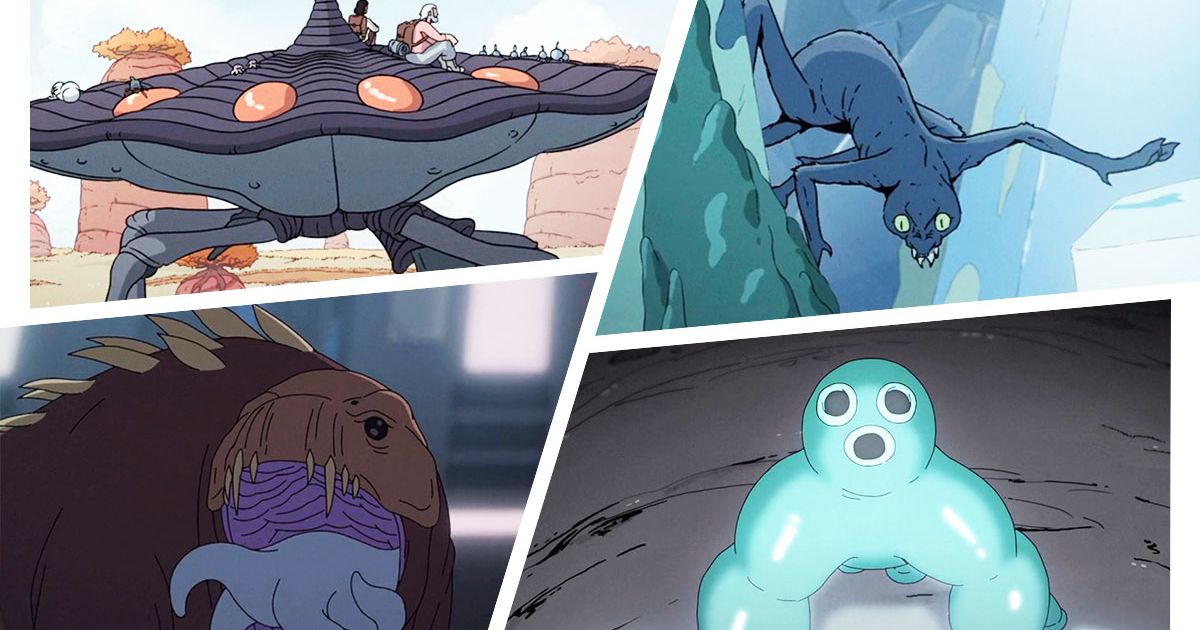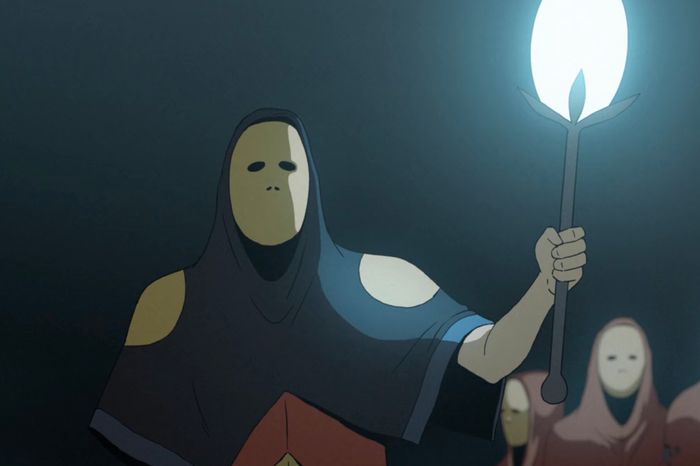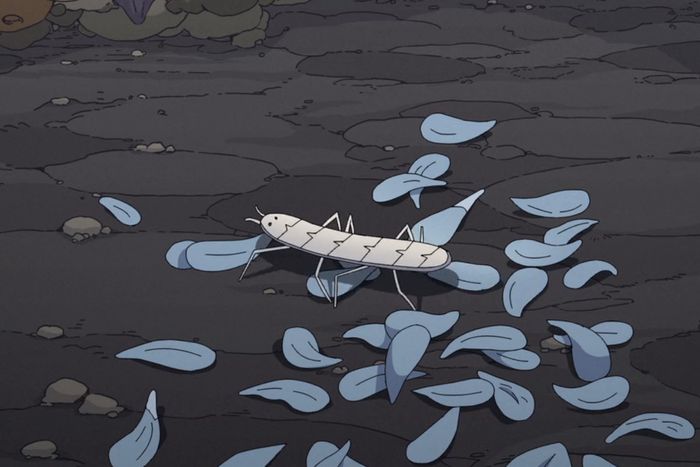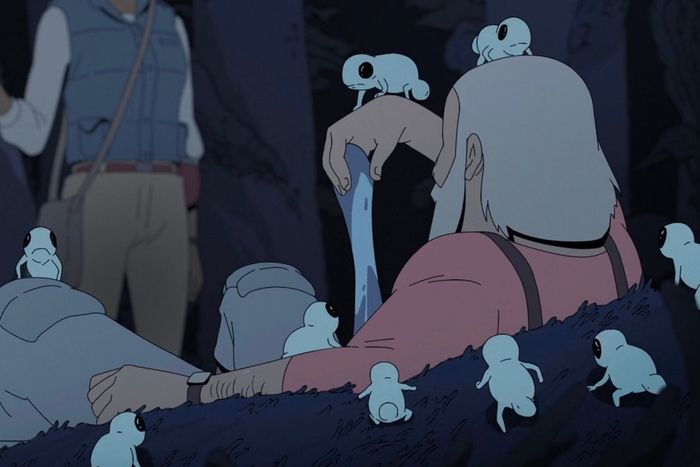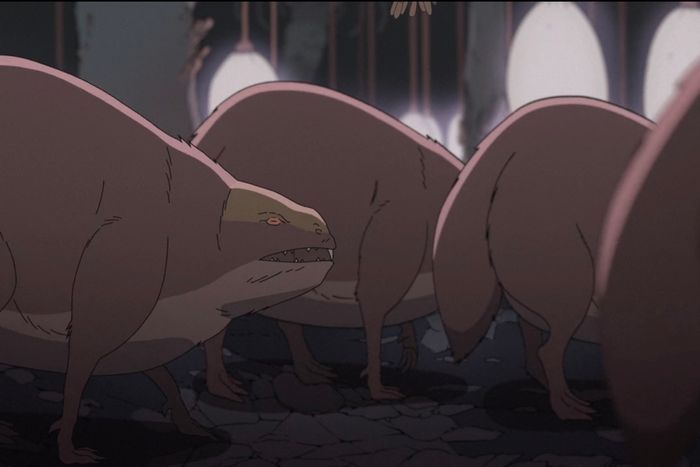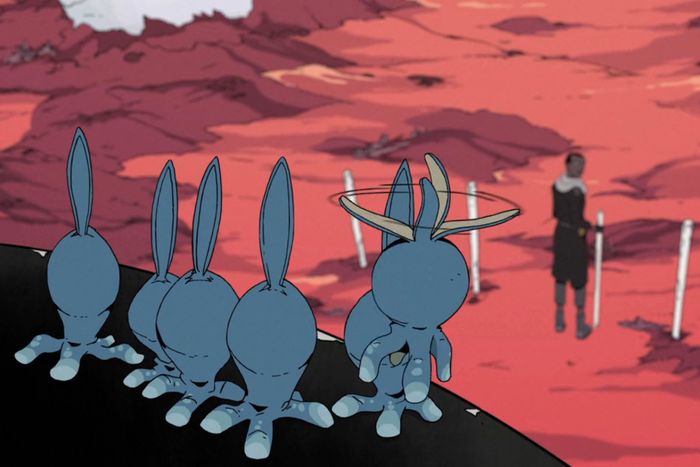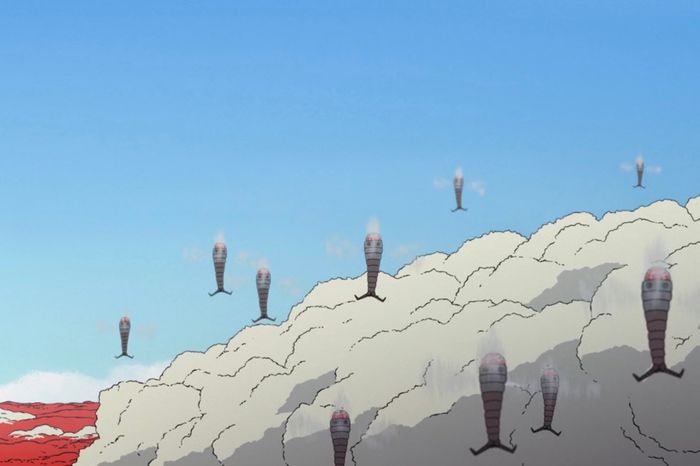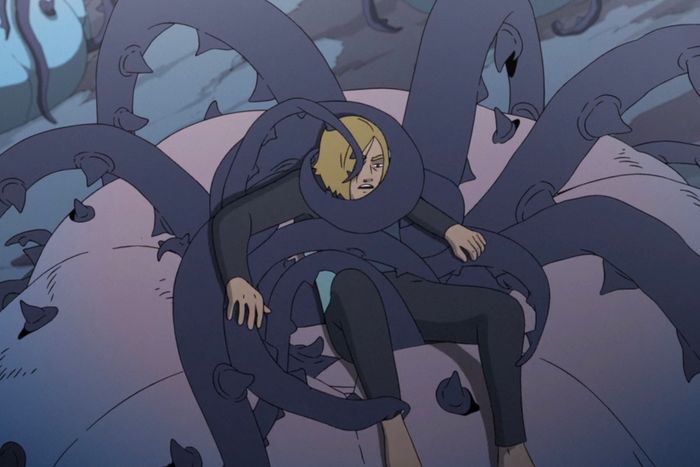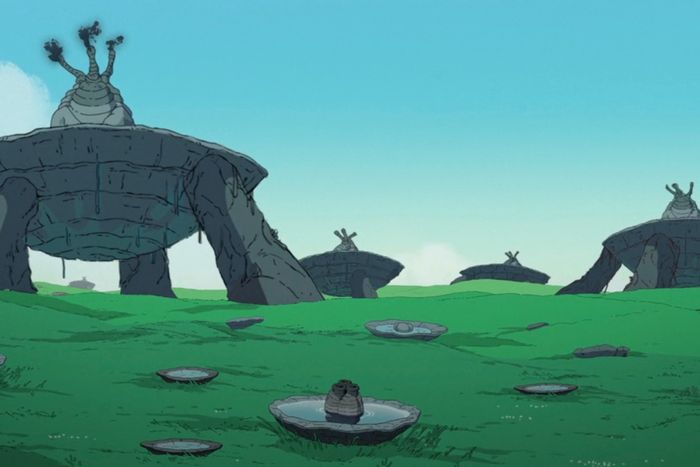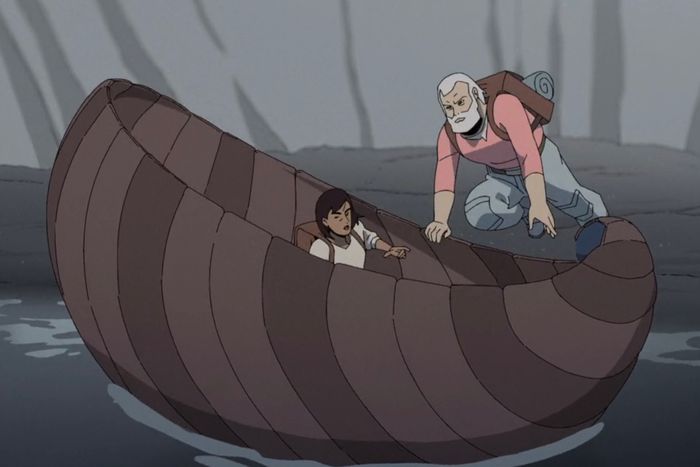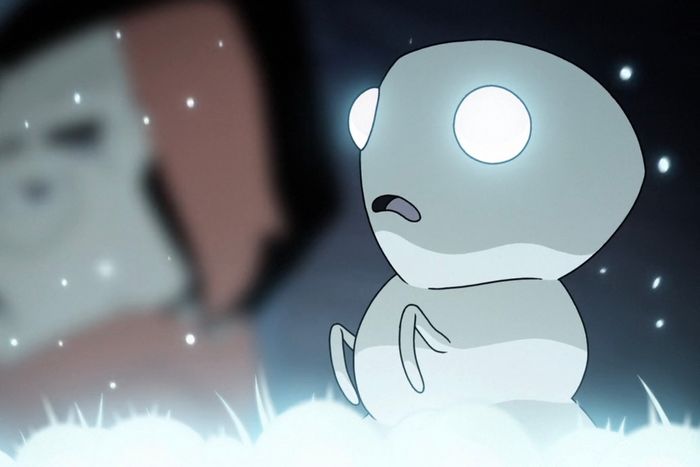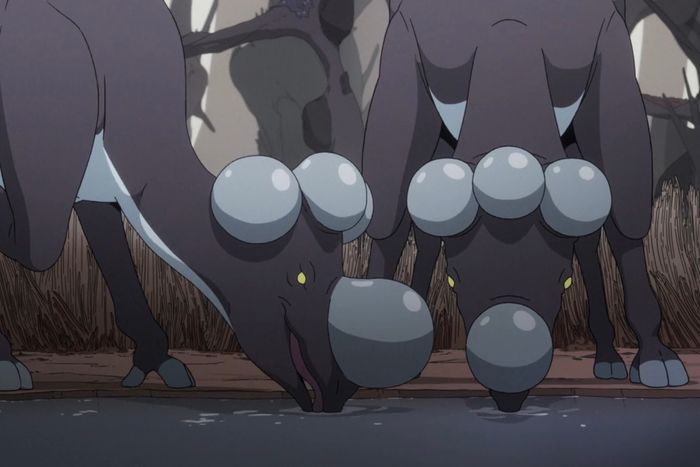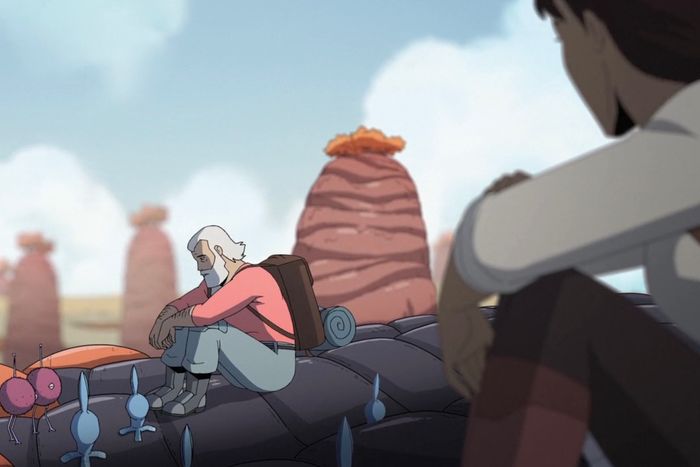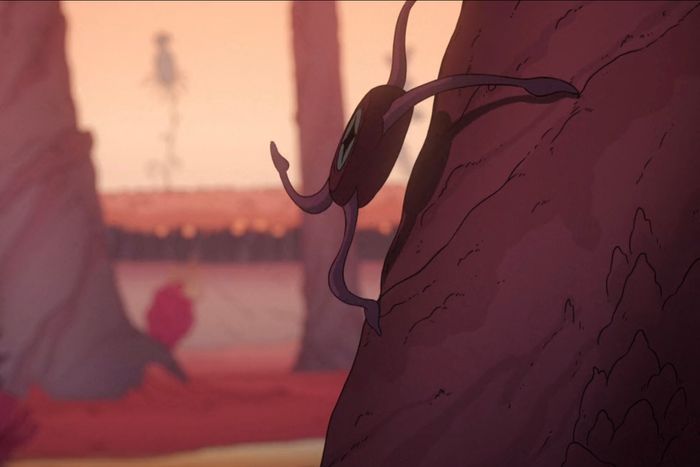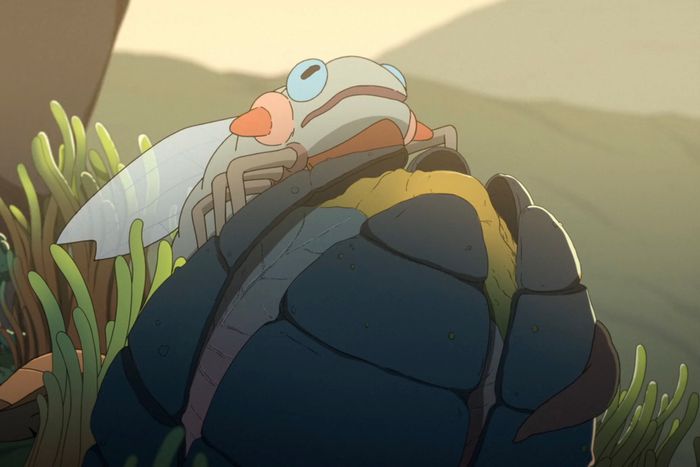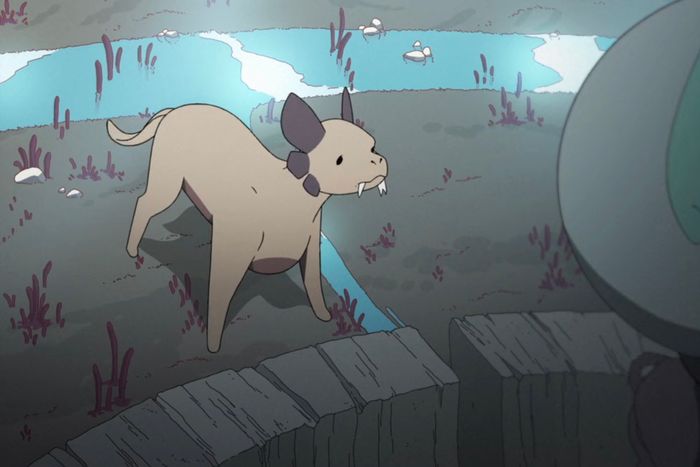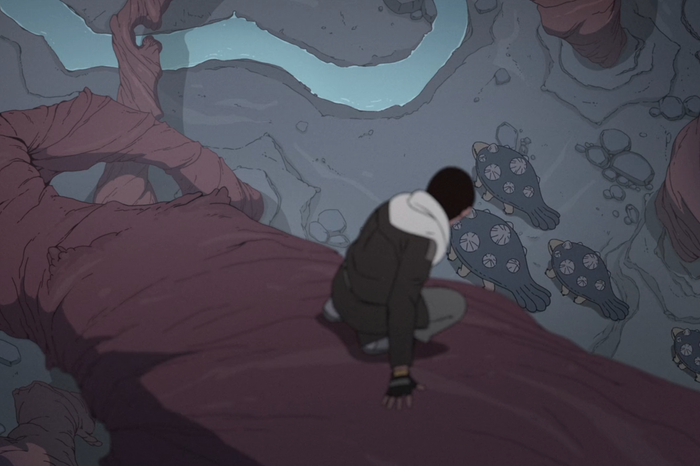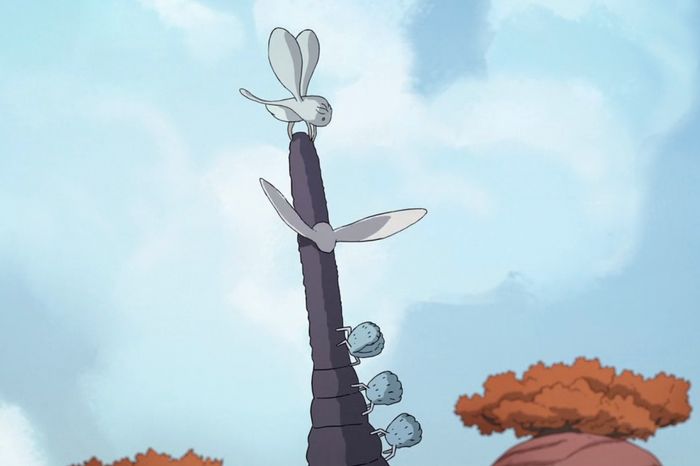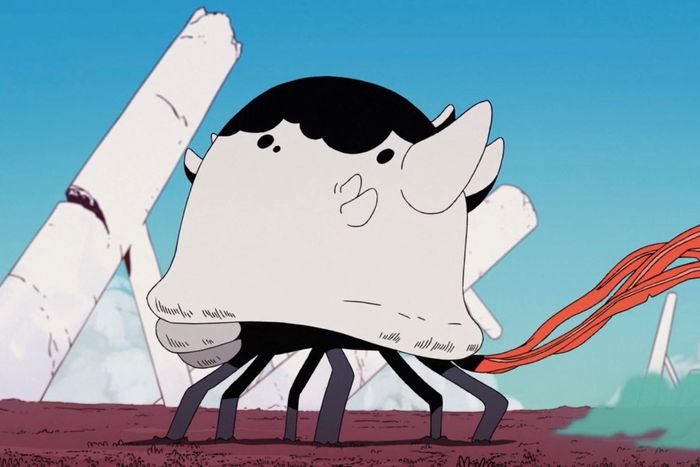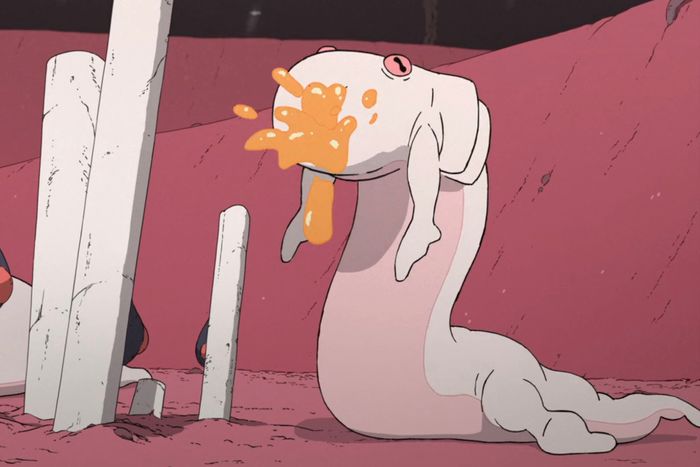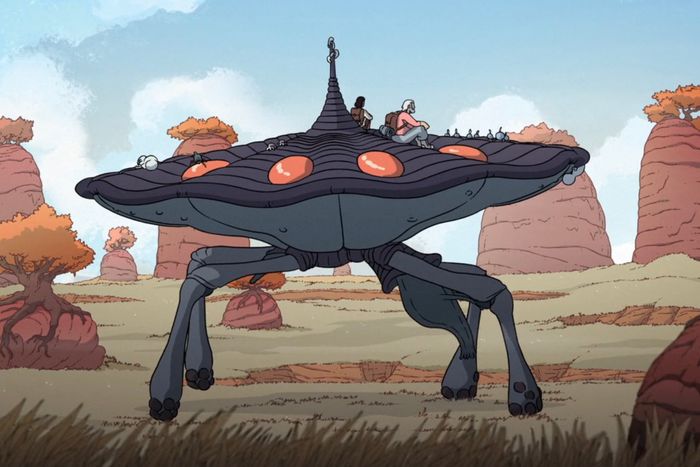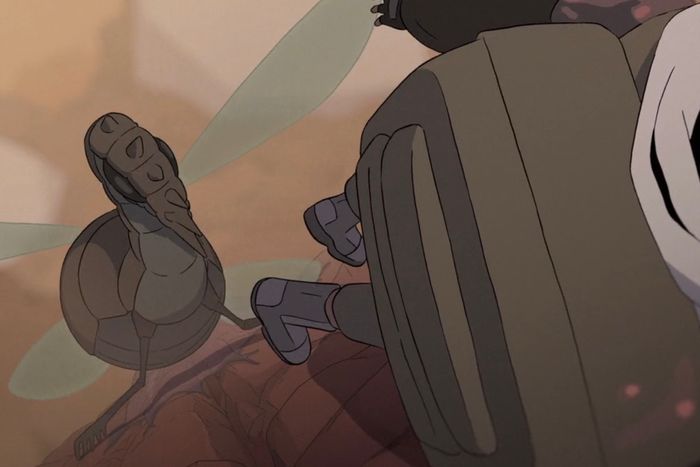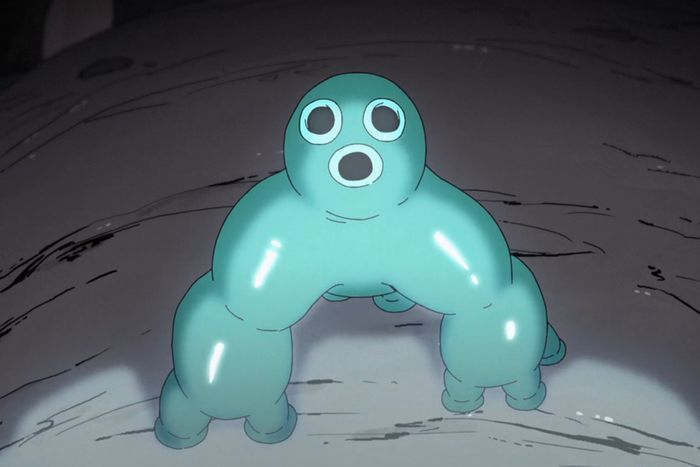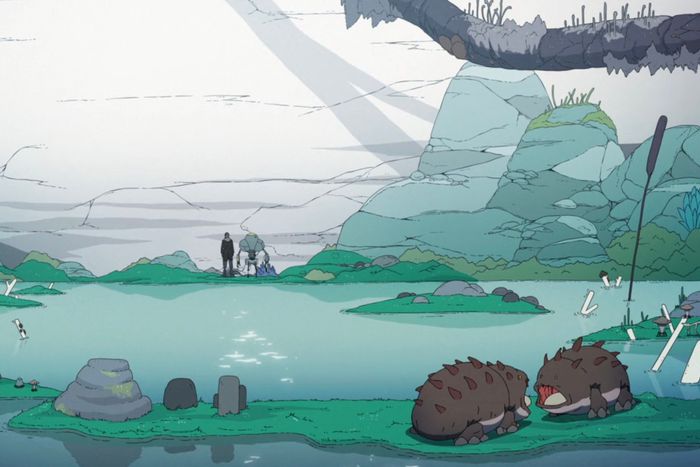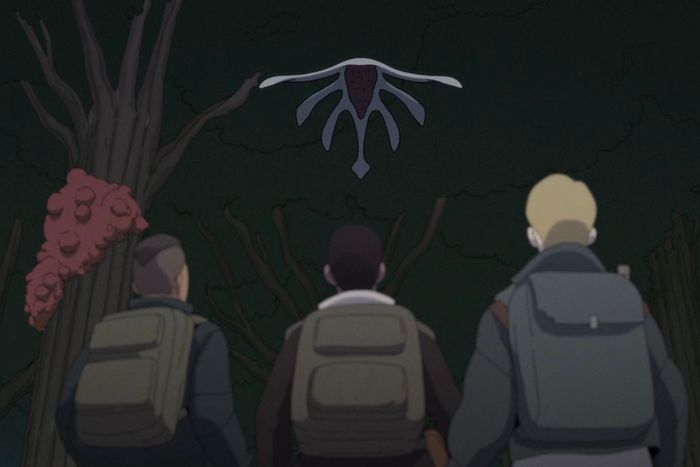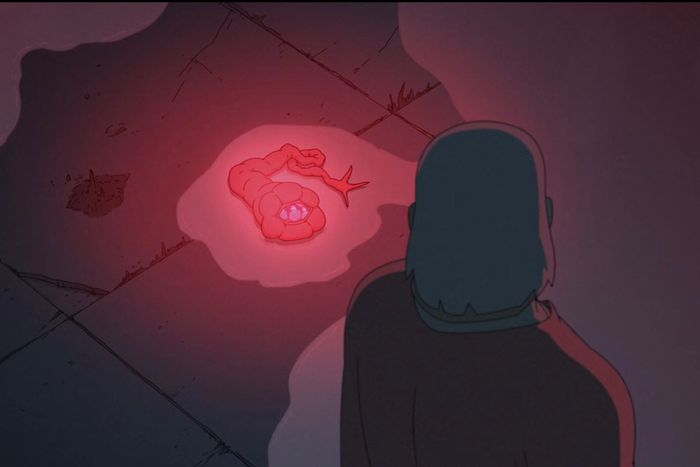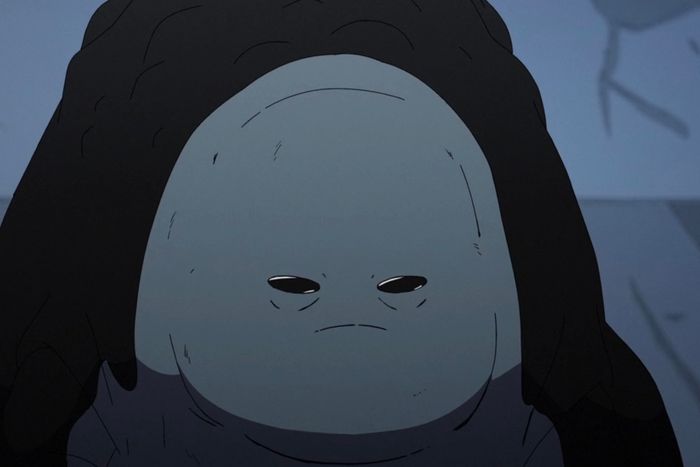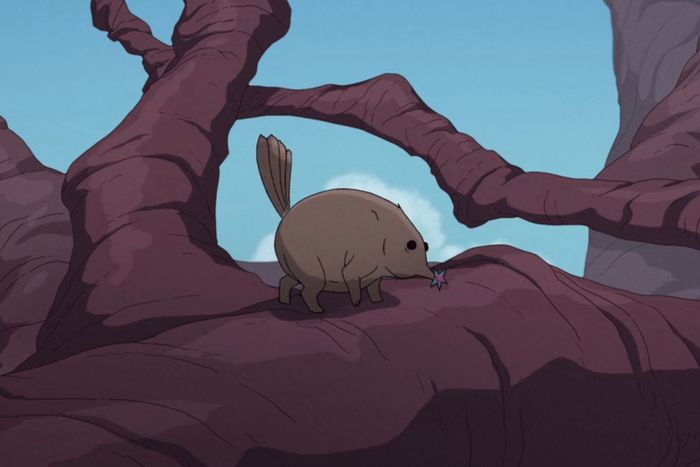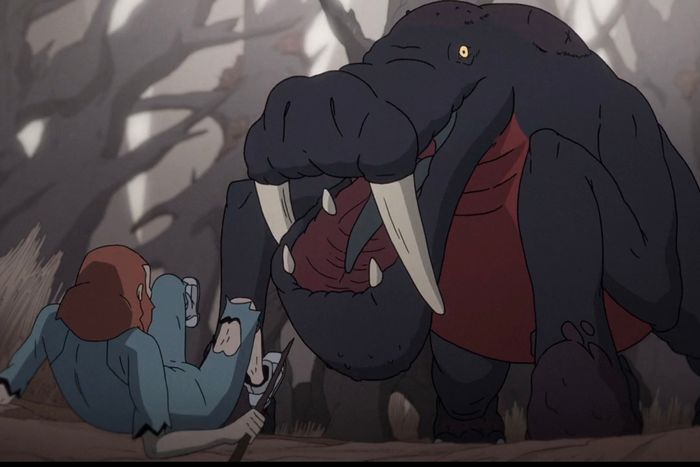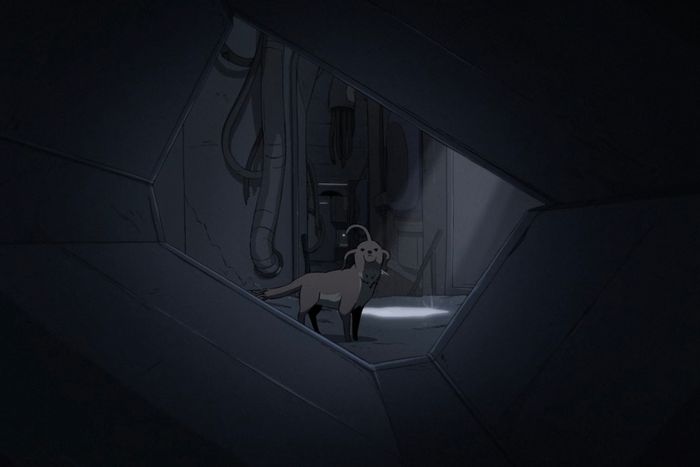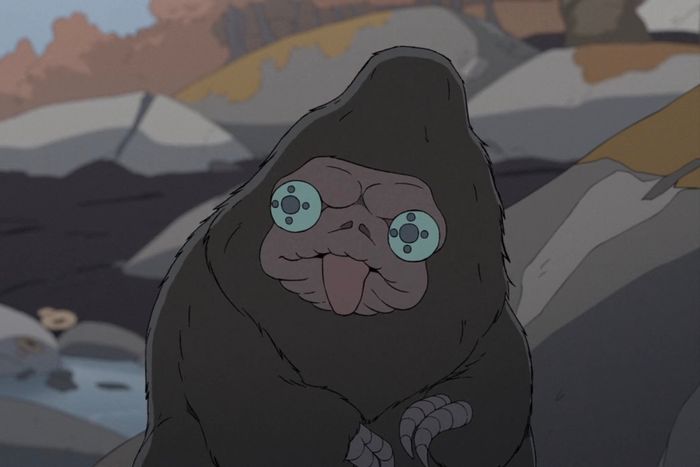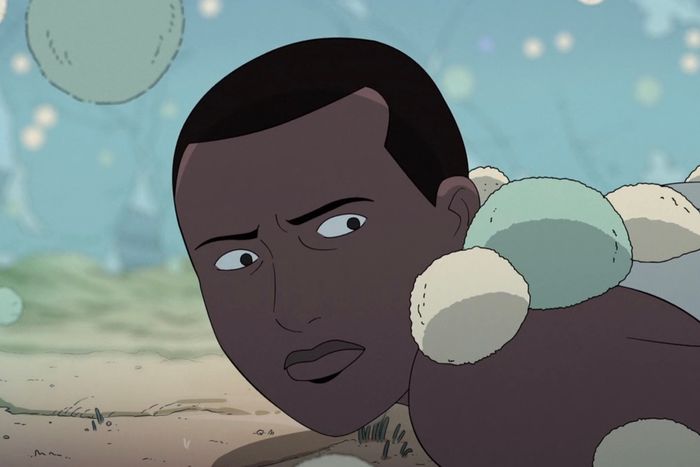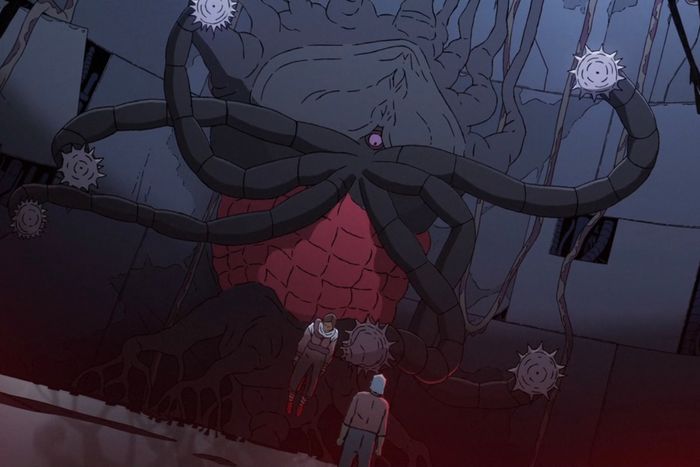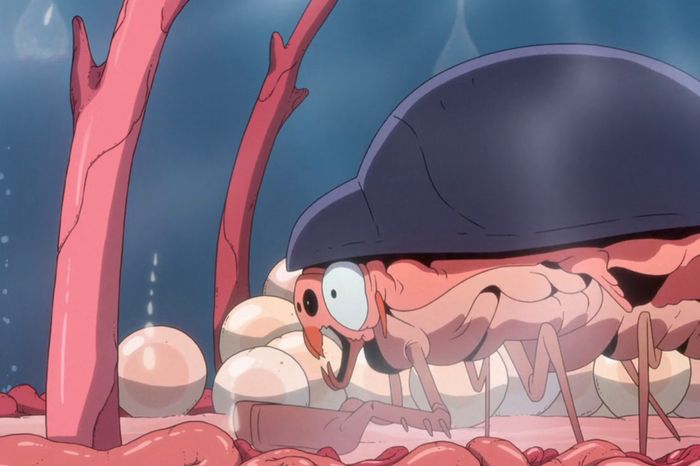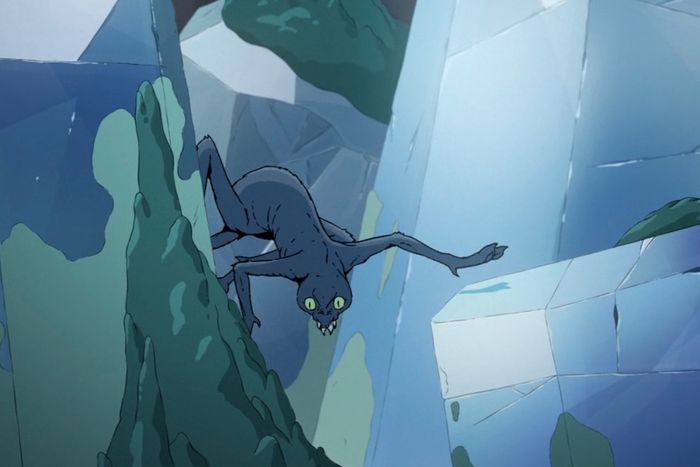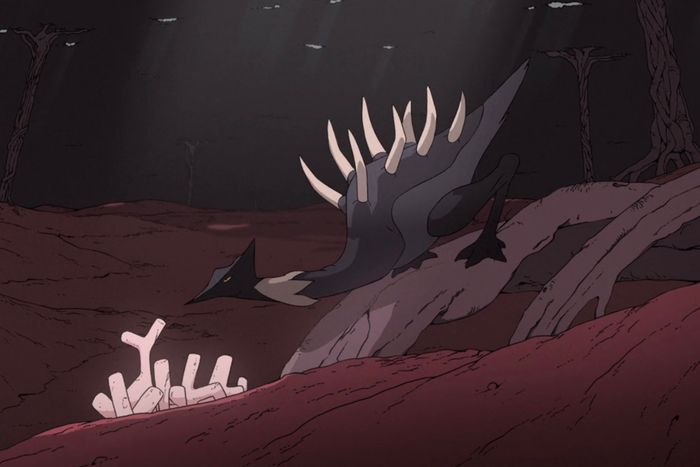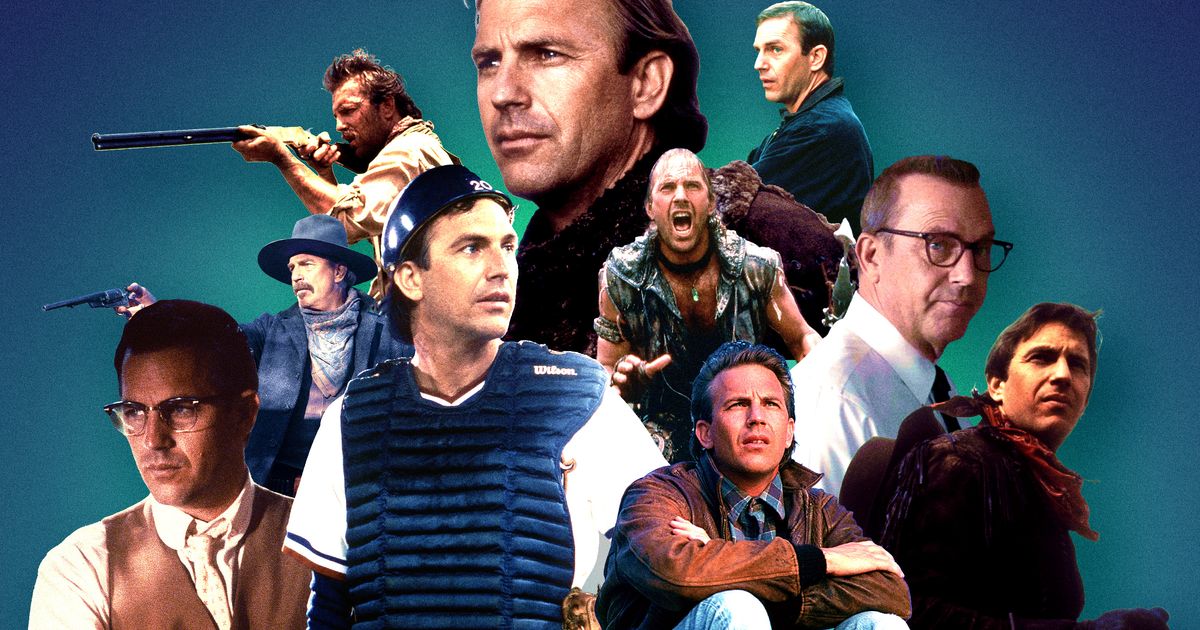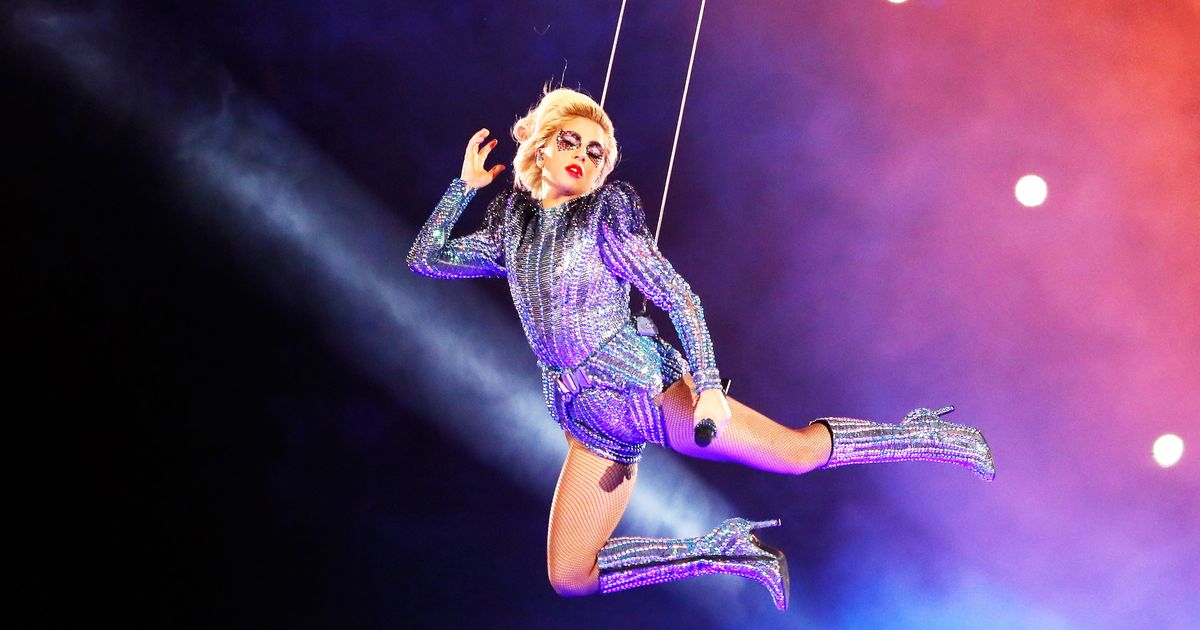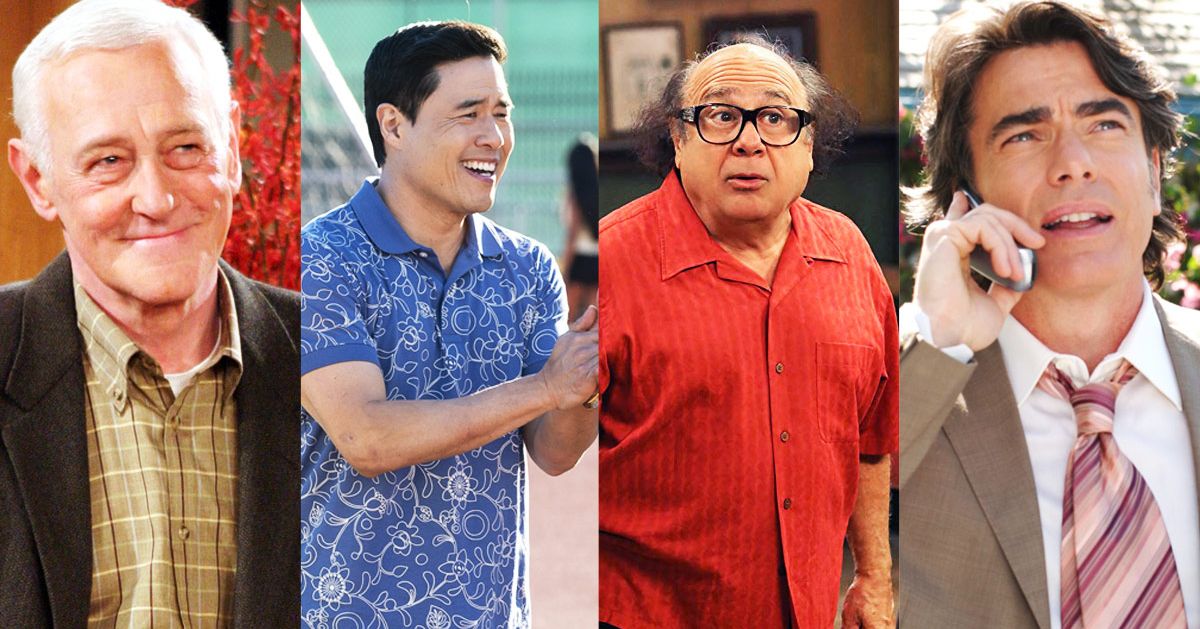Adorable critters, sentient geology, and other fauna intent on attacking you.
Photo-Illustration: Vulture; Photos: Max
This story was originally published on February 15, 2024. On May 31, Scavengers Reign debuted on Netflix.
In Scavengers Reign, the astonishingly creative, shockingly grisly animated series nominated for four Annie Awards, anything (and nearly everything) on the planet Vesta is a threat. The season follows three groups of crash-landed survivors from the cargo ship the Demeter 227 as they try to find their way home; the journey across the planet back to the Demeter isn’t easy, though, as Vesta’s flora and fauna keep getting in their way.
Commander Sam (voiced by Bob Stephenson) and horticulturist Ursula (voiced by Sunita Mani) are attacked more than once by seemingly innocuous creatures with brutal abilities. Crew member Kamen (voiced by Ted Travelstead) forms a parasitic relationship with Hollow, an animal with telepathic and telekinetic powers that convinces Kamen he’s back on the Demeter with his estranged wife, Fiona (voiced by Alia Shawkat); what Kamen is actually doing in his brainwashed state is massacring creatures for Hollow to eat. And cargo specialist Azi (voiced by Wunmi Mosaku), who is initially cold to robot Levi (also voiced by Shawkat) and treats the robot more like a servant than a friend, realizes that the planet is changing her companion into something different — something more like Vesta itself.
Scavengers Reign, adapted by co-creators Joseph Bennett and Charles Huettner from their 2016 short film, Scavengers, folds us into these story lines through its extremely detailed landscapes of saturated color, unexpected shapes, and absurd creatures. The series is full of texture and movement thanks to its extensive library of living things — some cute, some lethal, some both — and nearly every scene introduces the Demeter’s crew to the biological idiosyncrasies of this planet. Below, we tallied as many of them as we could spot, 54 creatures from Scavengers Reign’s 12-episode first season, ranked by a hybrid measure of weirdness, adorableness, emotional impact on the series’ characters and us as viewers, and whether you’d still try to pet this thing, even if it might kill you.
Photo: Max
Okay, I’m going to start off with a bit of a technicality because these masked characters are seemingly people, not creatures, and they’re not even on Vesta; they’re inhabitants of a ship in some other part of space. But what’s their story? Are the masks and robes ritualistic? Is this an Eyes Wide Shut situation? Are they part of a religious order? Have they been to Vesta before? If Scavengers Reign gets a second season, I would really like these mysterious dudes to play a central role so I can yell “Fidelio!” at the screen.
Photo: Max
Odd, inoffensive.
Photo: Max
Odd, inoffensive, slightly more memorable than No. 53 because of those gigantic eyes.
Photo: Max
Capybaralike biology with cowlike docility. They seem nice.
Photo: Max
How do their vertical ears (maybe??) give them the power of flight and defy all my understanding of gravity and physics? Charming! (See also: No. 36.)
Photo: Max
Same idea as No. 50 but slightly higher placement on this list because they go so much higher into the sky. That’s above-the-canopy altitude.
Photo: Max
This giant pincushion with pythonlike tentacle arms tries to strangle Charlie, the character voiced by Skyler Gisondo, and is therefore my enemy. This is a story in two parts, continued in No. 47.
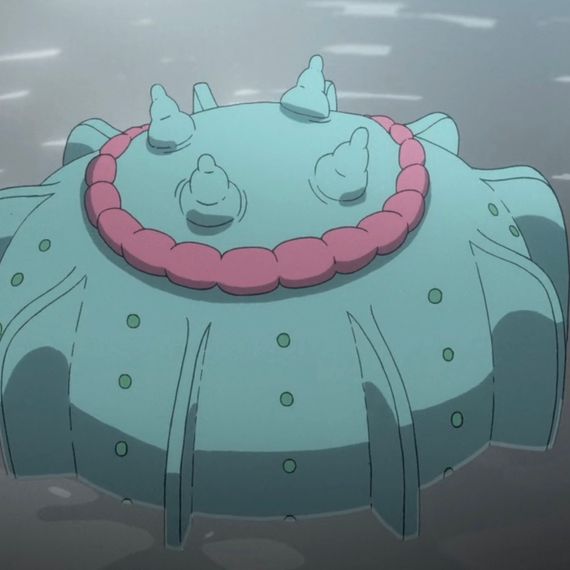
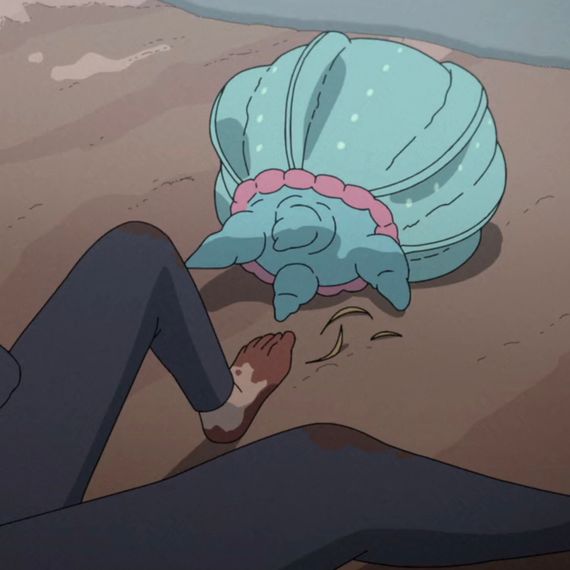
From left: Photo: MaxPhoto: Max
From top: Photo: MaxPhoto: Max
This glowing blue sponge looks like a children’s bath toy or a miniature version of some kind of carnival ride, until it launches itself out of the water and starts ripping out chunks of Charlie’s scalp. Mean, rude, low-ranked as a result.
Photo: Max
Strong Studio Ghibli energy from these gigantic rocklike creatures that I first thought were just geological features, but their middles spew black smoke, so they may actually be alive? Keeping them near the bottom of the list to hedge my bets, but they are pleasantly statuesque.
Photo: Max
Love a bug husk that can be flipped over and repurposed as a boat. That is very useful. Thank you to the huge bug I never want to see when it is alive!
Photo: Max
Scavengers Reign’s version of the hookah-high caterpillar from Alice in Wonderland. He’s just swaying back and forth, and he’s not bothering anyone. On this planet, that’s something to be grateful for.
Photo: Max
Those balls are what — bone? I don’t know. I just think it looks rad. But these animals don’t really do anything. If only they did.
Photo: Max
Whoever thought of giving a Koosh ball skinny legs, thank you.
Photo: Max
This thing ricochets itself around to move, which is a point in its favor. But it doesn’t have an expressive face, so it’s hard to imprint on.
Photo: Max
It’s like they took a frog’s face and put it on a bug and then gave it pencil erasers for ears. Inspired.
Photo: Max
More on ears: Look at this good boy!
Photo: Max
We never see this creature head-on, but from above it looks like a giant tortoise-slash-beaver thing with succulentlike rocks growing on its shell. I am intrigued?
The beauty of evolution is that it creates all kinds of opportunities for camouflage — for animals to disappear into an environment that they have adapted to and that has, in turn, adapted to them. That’s a recognizable construct. But a bird that literally vanishes into whatever it lands on (and so gracefully, no less) is one of those little touches that reminds us Vesta is actually alien as hell.
Photo: Max
The great thing about so many Scavengers Reign creatures is that their body parts often look like other body parts, so you’re constantly unnerved by — but curious about — what you’re actually looking at. The critter in the top of this frame above can fly because it’s perched at the top of another creature. But whether those are wings or ears at the top of its body is unclear, but either way: Memorable!
Photo: Max
Do you remember the Tualapi, the massive bird monsters from Philip Pullman’s The Amber Spyglass that attacked and destroyed the Mulefa villages, sometimes seemingly just for fun? These creatures, which look like thimbles with tongues and enjoy beating up Levi, really give off that vibe.
Photo: Max
This creature’s whole deal is going around from plant to plant eating those black-and-red fruits, which explode in its mouth in a burst of orange goop. That’s it — that’s the whole thing — and I find such a clarity of produce purpose aspirational.
Photo: Max
Another Ghibli-evoking creature, this time an oversize mushroom that grew legs and went for a walk. It’s solid (and strong) enough that both survivors Sam and Ursula and a variety of other animals can hitch a ride, so it’s basically the closest thing Vesta has to public transportation. Convenient, actually!
Photo: Max
This avian-insect amalgamation is big enough to nearly pull Azi off a cliff face that she’s free soloing and reminds me of the grotesque flying parademons from Zack Snyder’s DCEU films. I thought those creatures were legitimately evocative of the horror Darkseid would use to end the world, or whatever it was he wanted to do. I could have rewatched Justice League to better make this comparison, but … I didn’t.
Photo: Max
I dare you to look at this thing and not want to put it in your pocket and take it everywhere with you. Where is its stop-motion franchise?!
Photo: Max
Something about this pair, which look like they are yelling into each other’s mouths, makes me think of two old friends catching up at the watering hole after not seeing each other for a while. Their weird, spiky backs and squat bodies also make me think of what would happen if a hedgehog and a stegosaurus fused? It’s a thought experiment.
Photo: Max
More dinosaur thoughts about this guy, which looks like a pterodactyl crossed with an Alien facehugger and, like the latter, spews acid and squeezes its prey to death. It’s beautiful and gnarly, which is Vesta in a nutshell.
Photo: Max
A gigantic eye and optic nerve that glow red of their own volition and somehow look judgmental? Congratulations to the animators for that emotionality.
It’s so rare that a dangerous-looking creature on Vesta ends up being benign, let alone handy. All those teeth? But this one’s just hungry for dead skin, setting up a nice, spalike experience for Azi. Nice to know that Vesta could have one pampering tourist attraction if it so chooses!
Photo: Max
I hate every aspect of this thing: I hate its telekinetic ability; I hate how it feeds its brainwashed subjects chunky black goop as a way of keeping them controlled; I hate how big and telepathically powerful it gets and the fact that its mass doesn’t slow down its speed. I didn’t care for it at all! But it does play an important role in Scavengers Reign by making Kamen’s guilt real for us as viewers, so in the middle of the rank it goes.
Photo: Max
Is anyone still saying squee? This jaunty guy (that tail! That snout!) deserves it.
Photo: Max
Big fan of this guy, which I perceived as Barney the friendly dinosaur, if he got swole and admitted that not everyone deserves his friendliness. He should have eaten Kamen, honestly.
Photo: Max
A few animals in Scavengers Reign make it seem like the animators pulled inspiration from Pokémon. This fetching fox with antennalike tendrils on top of its head reminds me of Eevee, and …
… This majestic dragonlike bird or birdlike dragon seems a bit like the legendary bird Pokémon Lugia. Its wispy mustache blowing in the wind is a lovely touch.
Photo: Max
You could put this dude on some random planet with a reclusive Luke Skywalker and he’d fit right in.
Photo: Max
These megasize spores move in a cloud, stick onto skin, and don’t let go as they feed on you like leeches. Evolution in action, because who would be suspicious of these fuzzy dryer balls? Then you’re dead.
Scavengers Reign has some fun with wordplay, and here’s the first one on the list: a literal skipping stone. Sometimes the simplest things are the best things.
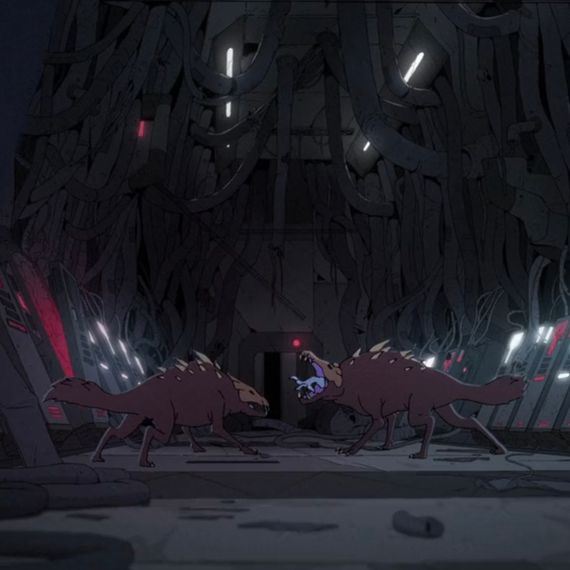
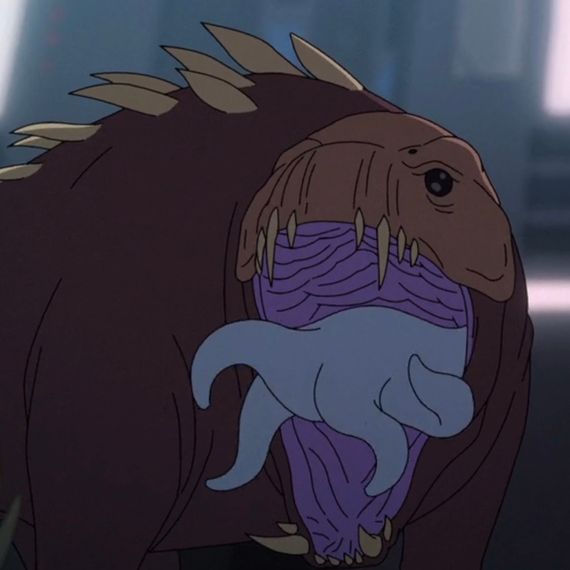
From left: Photo: MaxPhoto: Max
From top: Photo: MaxPhoto: Max
The Jurassic Park raptors of Vesta, frolicking amid humanity’s ruins on the crashed Demeter. Those squidlike mouth-feelers would make the Reapers in Blade II so jealous.
How can one little creature have so much personality (part one)? The shocked face formed by its eyes and ears!
How can one little creature have so much personality (part two)? Its expanding body as it takes a drink!
How can one little creature have so much personality (part three)?! The fact that its forehead is also somehow its nose!
Who was the first person to stick their fist in this animal and cause it to inflate? You might want Scavengers Reign to explain how survivors like Sam, Ursula, and Azi knew to use all these bizarre creatures in myriad ways. But the series is so confident in how it places us in this environment and amid these action set pieces that the why of it becomes less and less important. Season premiere “The Signal” asks you to get on its wavelength immediately with this sequence in which Sam and Ursula descend into a toxin-filled cave to retrieve equipment they need. The balloon feels like something out of a Roald Dahl novel, while …
… The face mask that Sam and Ursula use to breathe in the cave is just body horror at its finest. The close-up on the tentacles wriggling before Ursula sticks this thing in her nose? Yucky and fantastic.
There is this moment in “Vichnaya Pamyat,” the finale of the miniseries Chernobyl, when Stellan Skarsgård’s character has returned to the radiation zone, a place of death — and a tiny green inchworm crawls across his hand, proving that life and beauty still exist. In Scavengers Reign, as Sam lies dying, the bug that skitters on him and then puffs into a sphere that floats away is likewise a bittersweet nod at renewal, one life continuing as another ends. It’s as moving a eulogy as Sam could ever receive.
Photo: Max
It’s an arachnid; it’s genitalia — it’s both! It also has what look like flail striking heads on the end of its limbs, because why not just add more horrors to this thing? Also of note is that it starts as a coin-size seed that latches on to someone’s heart and eventually takes over their entire body. Love a parasite with big dreams.
Photo: Max
A gigantic flea covered in armor that makes it look as if it’s wearing an old-school military helmet. Starship Troopers wishes!
That bug follows Sam and Ursula into a jellyfishlike animal’s egg sac, which resembles a laboratory flask — or a bottle with a message in it — bobbing in the water. Ursula often serves as the series’ “Will you look at this shit?” audience stand-in, and her amazed reaction at the ball pit of eggs they fall into and the translucent barrier protecting them from the turbulent sea is totally warranted here.
Photo: Max
After the skipping stone (No. 19), here is the series’ second cheekiest bit of wordplay: It’s a feline-seeming creature that lurks shoreside and uses its own tail as a kind of balancing rod underwater. When Ursula falls out of the exoskeleton boat, one of these creatures is already waiting in the water, and it climbs up its own held-vertically-stiff tail to reach and attack her. It is essentially the aquatic cattail plant reinterpreted as a mammalian monster. Wild stuff!
When that first red chest pops? Inject that transportive feeling of wonder directly into my veins.
Vesta is jam-packed with blink-and-you’ll-miss-them critters that pop up for a few seconds, shuffle across a landscape or soar in the air, and are never seen again. This sequence lets all those organisms take center stage with their teeter-totter movements, bizarrely imbalanced gaits, and good intentions.
It’s not exactly a surprise when Levi comes back to life in the final act of the season. The robot voiced by Shawkat is clearly an important character from the beginning because of how it’s being changed, physically and emotionally, by Vesta’s organic matter growing in its insides, and Hollow tearing it apart is an impetus for Azi to realize the depth of her feelings for her friend. Levi’s reveal, though, is still a wallop — the vibrancy of its new collaged exterior, the confidence with which it moves, the leadership position it now holds with Vesta’s creatures. Those wild things from No. 6 did a good job, and Levi’s resurrection connects the robot (and the human survivors it once served) even more deeply with the essence of Vesta.
Photo: Max
In terms of pure creature design, this guy is my favorite in the whole series: an ostrich-size, roadrunnerlike bird with a blocky, triangle-shaped head and a ridge of spiky bones poking out of its back. That’s already metal enough. How this creature has adapted to its environment makes it even more special: Ursula learns that it can vertically run up the inside of a tree trunk and climb above the canopy to reach the sky, and it has the ability to conduct heat and use it to cook prey. An adapter, a survivor, a chef.
A dialogue-free, over-three-minutes sequence in which Ursula watches the entire life cycle of a minuscule creature that is born and dies inside the complicated petal design of a glowing flower. It’s as if the Arquillians from Men in Black got the Tree of Life treatment, and its poignancy shows Ursula there’s more to Vesta than just despair.
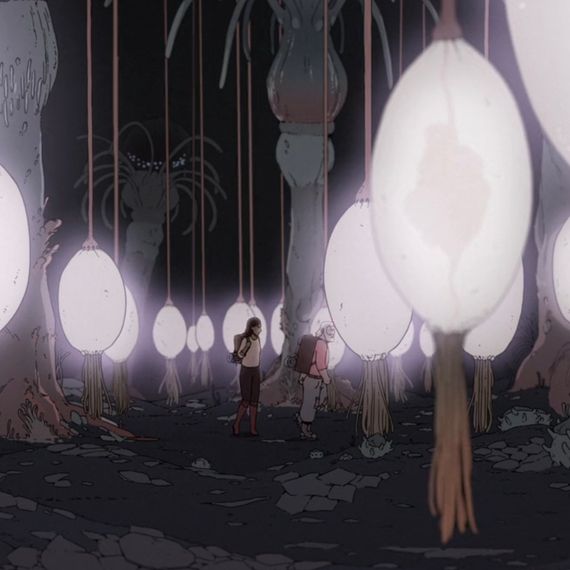
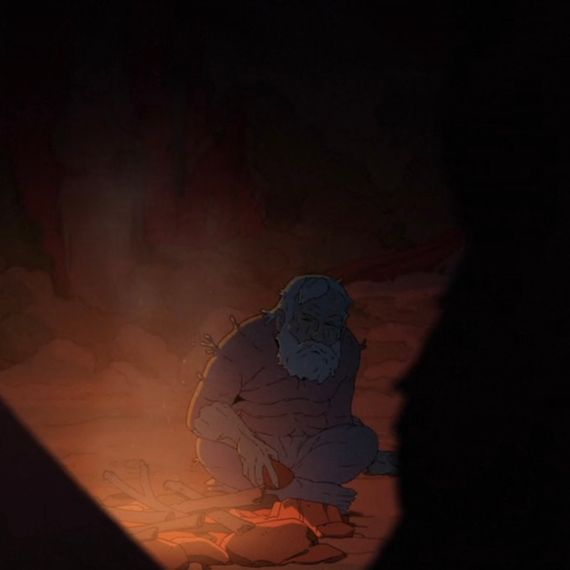
From left: Photo: MaxPhoto: Max
From top: Photo: MaxPhoto: Max
Yes, I’m including what is technically a plant on this list because of what that plant produces: In those glowing orbs are nightmarish copies of creatures the plant has infected. Once hatched, the copy hides and buries the original infected creature, then infiltrates that creature’s community and takes the original’s place. The copy then dies, too, spreading the plant’s seeds and continuing its invasive entry into new environments. The pod-person version of Sam is particularly unsettling — a swaying, inarticulate mass of flesh whose only purposes are to kill and to die — and that level of grotesquerie is hard to shake.
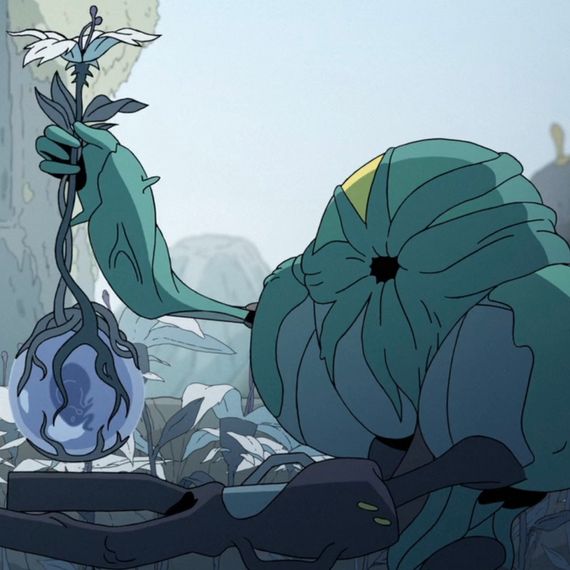
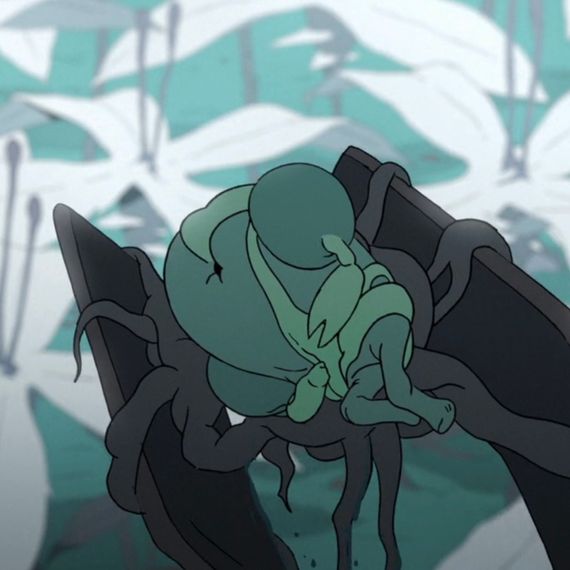
From left: Photo: MaxPhoto: Max
From top: Photo: MaxPhoto: Max
Unsurprisingly for a show about flora, fauna, and the biological processes that fuel both, Scavengers Reign is at its core about the passage of time and what occurs within it. Levi lives; Levi dies; Levi is reborn — and born again and again and again as the lily flower that grows in Vesta in places of death then starts to grow with an orb attached to its root system. And within the orb is another Levi, who then in turn grows up, lives, and dies as a new species in Vesta, one that was born because of the presence on the planet of an unalive member of the Demeter crew. It’s finally a moment of reciprocity on Vesta, and it challenges — like so many of what these creatures did — everything the Demeter’s humans thought they knew about the experience of being alive. Plus, look at the little bugger! Baby Levi embodies Vesta’s transformational manifestation of life and death, and it looks damn cute while doing so.




